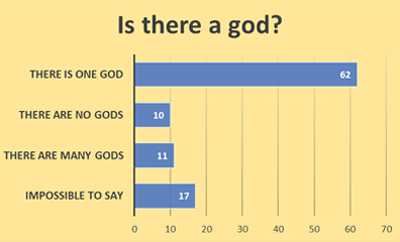Belief in Gods
Do Children Believe in God?

Religion has suffered over the last few centuries. Before the Enlightenment almost everybody accepted what they were told. Belief in the Bible was a given and it was a brave man or woman who would speak against it. But then came science with logical explanations that solved many of the mysteries which beforehand had relied on supernatural powers. And religion ceased to be the dominant power it once was.
Since then church attendance has been steadily falling. In 1900 almost 100% of Brits attended some kind of church regularly. By 1980 this was down to 9% and today it is closer to 5%. So, you would expect, with this drastic drop in religious faith, that belief in some kind of god would also have dropped.
For our latest survey we wanted to find out what children believe. Do they follow the religion set down by their parents, or do they have a more secular world view? To find out we asked a total of 2,307 children “Which option comes closest to your beliefs?”
We gave them four possible answers, hoping to cover each potential viewpoint. Here are the options we gave, along with the percentage of respondents who voted for them:
- There is one God (Abrahamic religions) – 62%
- There are many gods (polytheistic religions) – 11%
- There are no gods (atheistic belief) – 10%
- It is impossible to say (agnostic belief) – 17%
The results are clear – three-quarters of children believe that there is some kind of god or gods, while only 10% have no such belief.
Decline in Belief in Gods
Since time immemorial religion has been accepted as truth by most. Even after Darwin disproved the Christian Creation myth, still atheism only gained a foothold amongst intellectuals and the educated. But this has been changing since the latter half of the 20th Century. Over the last 40 years or so church attendance has halved. Not because people stopped going, but because the children, formerly indoctrinated in their parents’ faith, started to reject these beliefs.
This is a phenomenon witnessed in most developed countries. With education becoming a part of our society, religion is losing its place in our cultures. In under-developed countries though, religion is still holding strong. Indeed, it is perhaps thanks to the immigrations to Britain that belief in gods here is still so high.
Religion in 21st Century Britain
In the 2011 Census, respondents were asked whether they followed a religion and, if so, which one. This is what they said:
- Christian: 37.5 million
- No religion: 16.2 million
- Refused to say: 4.5 million
- Islam: 2.7 million
- Hindu: 835,934
- Sikh: 432,429
- Jewish: 269,568
- Jedi: 176,632
That doesn’t look too bad from the gods’ point of view. It seems most people worship one or more of them. But compare this to the results of a poll conducted by YouGov in 2015. That found that 33% of Britons do not believe in any god or gods.
Interestingly, that survey also found that only 55% of Christians believe in a God, which does make one wonder why they call themselves Christians rather than atheists. Perhaps it is a cultural thing rather than a matter of faith?
Evidence for and against there being a god
Of course, mankind has been trying to answer this question since we first could speak. The greatest minds have pondered over the years, both for and against. So, what have they found out? Let’s look at the arguments…
God must exist. This is the Ontological Argument. Supporters claim that, if there is a reason for god to exist (such as the universe) then he must. The counterargument says that this idea does not hold up because the premise relies on the conclusion.
Morality. This theory says that, because we have morals, they must have come from god. Cynics would argue that morals are not universal. If they were then there would be no crimes. Morality is also subjective so this argument fails.
More or less. A favourite of Thomas Aquinas, this theory says that because we have good, and better, then there must be an ultimate best. This has to be god. The counterargument goes, just because there is a lesser it does not follow that there must be an ultimate greater. Richard Dawkins puts it like this: “Because we come across a ‘smelly’ object, that does not require that we believe in a ‘pre-eminently peerless stinker’.”
Reason. Espoused by CS Lewis, this argument relies on the mind. Our minds could not have appeared without design, therefore there must be a god. The alternative view rejects Lewis’ claims. There is no evidence that our minds are faultless, and reason is not necessarily proof for god.
Cause. Another of Thomas Aquinas’ faves. This argument relies on this: Everything in existence has a cause, and nothing can cause itself, therefore god must have caused the first things. The argument against this is infinite regression. If everything has a cause, then what caused the first cause, and what caused the cause which caused the first cause… ad infinitum.
Nobody can prove or disprove the existence of gods. The fact that so many believe there is at least one of them is an interesting one. Whether or not they are right is the ultimate question for us all.
More Survey ResultsFull Results of our "Do you believe in a god?" Survey
Here are the results from 2,307 people who answered our question "Which comes closest to your beliefs?" The survey was conducted in the week ending November 14th, 2020.
| Which comes closest to your beliefs? | Percentage of Respondents |
|---|---|
| There is one God | 62% |
| There are many gods | 11% |
| There are no gods | 10% |
| It's impossible to say | 17% |



